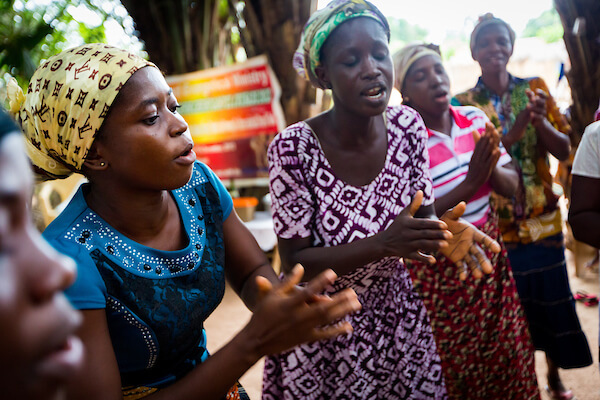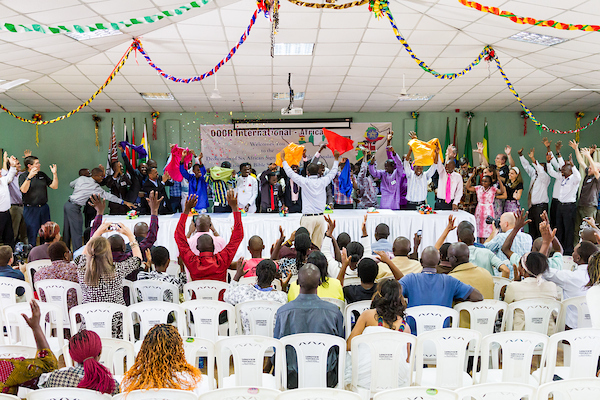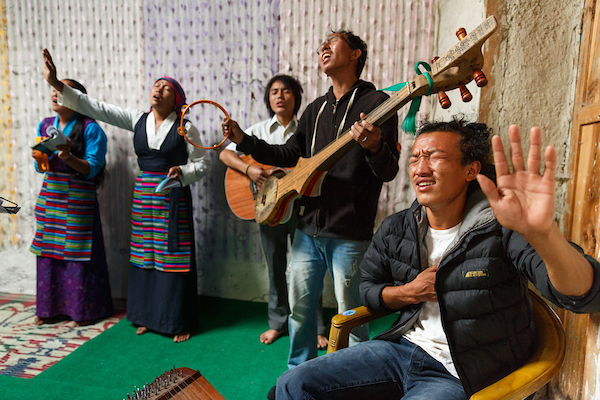Meditations
World Day of Prayer for Bible Translation
11 November 2025

Declare the Glory of God
This year is a time of celebration in the Bible translation movement. It is important that we celebrate well.
In the Bible, people celebrate God in two ways:
– for who He is, and
– for what He has done.
As we thank God for everything he has done through Vision 2025, we also remember his greatness and our highest calling. As the Westminster Catechism says:
‘Man’s chief end is to glorify God and to enjoy him forever.’
It is a great gift to have a whole day to delight in God, to give Him glory, and to enjoy Him together.
Celebrate with Your Culture in Mind
Think about how people in your culture celebrate. Think also about how other cultures around the world celebrate. Could you include some of these ways in your Day of Prayer? In many cultures, people celebrate with:
- special clothing
- parades or processions
- food and feasts
- dancing
- fireworks or candles.
Let’s not be half-hearted in our celebration but celebrate with all our energy—because God is worthy!
Using Psalm 150 as a Guide
Psalm 150 gives us a great example of how to praise God. Use it as a framework for your celebration.
Verse 1a: “Praise the Lord.”
Remember all the things God has done—especially through Vision 2025. This is not a time to focus on ourselves or to take credit for what has happened. We are here to declare what God has done. When we declare his glory, our own faith is encouraged and others see how great he is.
Verse 1b: “Praise God in his sanctuary; praise him in his mighty heavens.”
We also remember who God is. Together with the angels in heaven, we celebrate his holiness, justice, power, and love. Because of Jesus’ death and resurrection, we can come into God’s presence. Only Jesus was holy enough to take our sin upon himself and bring us into relationship with God. Let’s celebrate rescue out of his great love.
(Psalms 29 and 96, and Hebrews 1:1-4 can be good starting points for us to acknowledge that he is God and we are his creation.)
Verse 2: “Praise him for his acts of power; praise him for his surpassing greatness.”
The Bible often tells us to remember what God has done so we don’t forget. For example, in Exodus 13, God instituted the Passover to help his people remember how he brought them out of slavery.
Today, we take communion to remember Jesus’ death and resurrection and all it has brought us.
Psalm 145:4–7 (NLT) says:
“One generation commends your works to another; they tell of your mighty acts…
They celebrate your abundant goodness and joyfully sing of your righteousness.”

Declare God’s Power with Stories
Let’s share stories of how God has worked in our lives and in Bible translation. Ask:
- How has he changed us?
- What tools has he given us?
- What has he taught us?
- How have lives been transformed?
- How has he provided for us?
When we share these stories during the World Day of Prayer, it helps those who have been involved for a long time to remember God’s faithfulness, and brings encouragement to those who are newer to the movement. After sharing, let’s spend time giving thanks and praise to God.
Pray Together
After we celebrate what God has done, let’s pray and ask him to do even more.
For example:
- If you tell a story about a new partner God has brought to your work—thank God, then pray for them.
- If you share about a new translation project—praise God, then pray for the people group, asking God to bring transformation through his Word.
Verses 3–5: Worship with Music and Movement
“Praise him with the …trumpet, …harp and lyre, …tambourine and dancing, …strings and pipe, …cymbals.”
Celebration often includes music. Use whatever instruments and styles are meaningful in your culture. Or try music from other cultures too.
There are many ways to celebrate God’s glory—through music, dance, and even processions. Let your worship be joyful, loud, and full of life. Don’t hold back!
Let your community hear you declaring God’s glory!

Verse 6: “Let everything that has breath praise the Lord.”
Who can you invite to join the celebration?
Could you invite:
- partners and stakeholders?
- staff and volunteers?
- supporting churches and prayer groups?
- government or community leaders?
- leaders of other faith communities?
Also, consider using technology to include people who cannot attend in person.
Let’s invite many people to see the greatness of God and to declare His glory!
Pray Boldly – Trusting God for More
As we continue to pray, let’s not only look at the past—let’s look ahead.
In John 11, Jesus raised Lazarus from the dead. Before the miracle, Jesus delayed going to him, even though Mary and Martha had asked for help because Lazarus was ill. People wondered why Jesus didn’t go right away—they believed he could heal, but they did not seem to believe he could raise Lazarus from the dead.
Even Martha questioned Jesus at the tomb. But Jesus said:
“Did I not tell you that if you believe, you will see the glory of God?” (John 11:40)
Grow Your Faith – Pray Bigger Prayers
Are there areas in your life or ministry where you are still waiting for God to act? Do we need to grow our faith by reminding ourselves that God is “able to do immeasurably more than all we ask or imagine, according to his power that is at work within us” (Ephesians 3:20 NIV)? Let’s pray bold, faith-filled prayers!
Faith Goals and Continued Prayer
During your Day of Prayer, take time to pray for situations where you are waiting on God. Ask him to glorify his name through them.
Even after the World Day of Prayer, consider setting faith goals—specific things you are trusting God to do. Pray regularly for these things until they happen. Stand in prayer with others in the movement and believe for breakthroughs together.
Don’t forget to ask your partners how you can pray for them before the event.
Let’s declare the Glory of God—together, with faith, joy, and hope.
